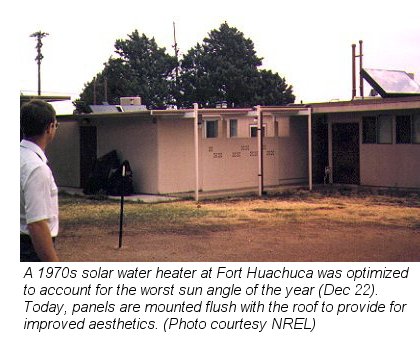Frederick Buechner wrote that there is a time for looking back over the past "and trying to figure out where we have come from and where we are going to."
Those of us involved in the solar energy field over the last few decades have been part of an ever-changing conversation. What was once good is now bad. What was once left is now right. And up is now down. At least that is how it seems.
When I first became involved in solar energy, the word "solar" was mostly associated with passive solar. It was more about how we designed our homes--construction orientation and strategies to make the most of the sun angles. Solar didn't mean equipment. During the 1980s and into the 90s, solar slowly came to stand for the technological apparatus that turn sunlight into work.
Of course today, solar is synonymous with solar electric. It is now used interchangeably with rooftop solar. One example of the changing conversation surrounding solar energy. And there are more.
In the 1970s, the holy grail for the solar community was for utilities to build solar power plants and to provide those green electrons to their customers. The thought of rooftop solar electric wasn't even part of the discussion because of its prohibitive costs. Of course, that conversation has changed. And it probably won't be the last time our expectations for a solar future change.

While touring Palo Verde Nuclear Generating Station with a college class in 1978, I remember asking the APS tour guide why they just didn't spend all that money on a solar power plant. His response was to have me imagine a summer dust storm (that is what we called them in the 1970s). He said that schools would have to be dismissed so the kids could clean the solar arrays to keep society humming. As absurd as that sounds, that was the response.
Nearly 20 years later, while touring the STAR (Solar Testing and Research) Center, I asked the APS engineer in charge how often they cleaned their solar panels. His response was that they had discovered that there was only a five to ten percent decrease in power production between rains, and that it didn't make economic sense to clean the panels.
A couple of months ago I received a flyer in the mail from a company offering to provide monthly solar cleaning services on my rooftop panels for a nominal fee. The times, they continue to change. . .
During the 1980s, the government agency I worked for was charged with educating the general public on the benefits of using solar water heating, and how to do it efficiently. We encouraged people to pay particular attention to the tilt and orientation of their solar panels. The orientation, of course, should be south and the tilt angle should take into account the lowest sun angle of the year--December. The panels were to be optimized for the worst day of the year.
A decade ago when hearings were being held to discuss solar incentives for homeowners adopting solar (electric and water), the utilities argued against systems that faced any direction other than south, even going so far as to suggest reduced incentives for "wrong" orientations. Today, they are arguing in favor of systems that face west, as they generate electricity during times of peak demand and are most valuable to the utility system. It is another example of the changing conversation surrounding solar.
During the early days of customer-sited solar electric, systems were situated beyond the reach of power lines. Solar electric's niche was off-grid applications for homes where conventional power was not available. Lead-acid batteries were the key to living beyond the utility infrastructure.
And in keeping with the tradition of change, battery storage, just like solar electric systems in general, is now finding its way into urban homes, allowing homeowners to generate their own electricity and store it for use at night. While for most people this more complex application is cost prohibitive today, who doesn't believe that in a few short years that will change as well.
Jim Arwood
Communications Director
Arizona Solar Center
Question: What changes have you witnessed when it comes to any and all things solar? What changes do you think are ahead for solar energy strategies and technologies?
